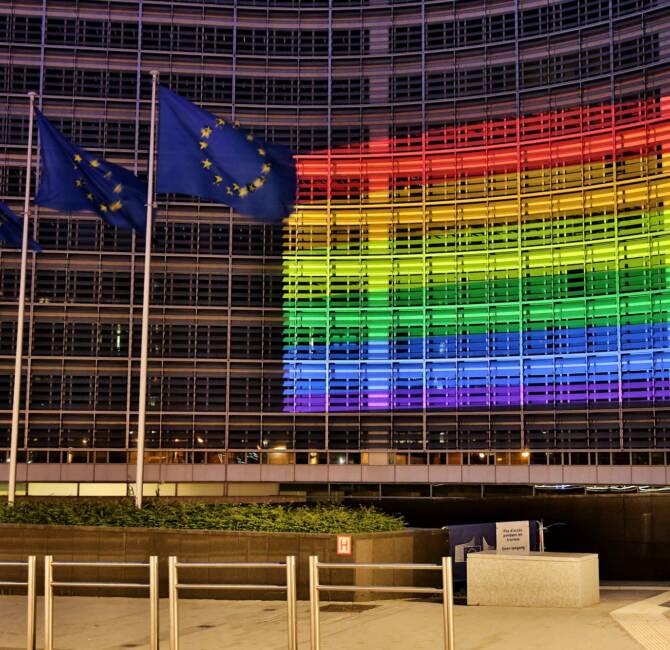Poland – For Polish Justice Minister Zbigniew Ziobro, the attitude of the European Commission, which is denying the Polish parliament the right to appoint the 15 judges who are to be members of the National Judicial Council (KRS), shows that “we are dealing with hypocrisy, we are dealing with politics and not law, and we are dealing with an aggression against Poland under the pretext of law, which serves other objectives than to introduce equal law for all within the European Union”. These words came at a press conference on Tuesday, during which the Polish minister also spoke of a “legal hybrid war against Poland in economic terms”, “because if you compare the situation of Poland and Germany, the inactivity of the European Commission towards Germany and its activity towards Poland, this is how these actions must be perceived.”
What once again infuriated the Polish minister was the news that the Von der Leyen Commission had filed a request for financial penalties against Poland with the European Court of Justice (ECJ). The Commission’s reason for this new initiative is that the ECJ ruling of 14 July, ordering Poland to suspend the activities of the disciplinary chamber of its Supreme Court, has allegedly not been fully implemented. As the newspaper Rzeczpospolita notes, until now the ECJ has imposed fines for failure to comply with its final rulings. In this case, however, the ruling in question is an interim order issued by a single judge of the ECJ, pending a judgment on the merits, and this in an area where, at least in theory, the ECJ has no jurisdiction in the light of the European treaties and the Polish constitution. Rzeczpospolita reminds its readers that the only previous time the Commission had asked the ECJ to impose a daily penalty payment for non-implementation of an interim order in recent years was also against Poland, and it concerned tree felling in the Białowieża Forest.
The European Commission believes that the Disciplinary Chamber created by a 2017 reform of the Supreme Court endangers the independence and impartiality of Polish judges, who are responsible, among other things, for applying EU law.
The Commission bases its criticism on the fact that the judges of this newly created Disciplinary Chamber were appointed by President Andrzej Duda on a proposal of the National Judicial Council (KRS) as reformed by another law enacted in 2017. As a result of the reform, the 15 judges sitting in the KRS (out of a total of 25 members) were appointed not by their peers but by parliament (as is also the case in Spain, for example).
For more information, see “The European Commission’s attack on the reform of the justice system in Poland: summary, chronology and challenges”
In Poland, Deputy Justice Minister Sebastian Kaleta also reacted strongly to the news of the Commission’s demand for a daily penalty against Poland, tweeting: “Germany, Spain, Romania and France. These are the countries that have not recognized ECJ rulings over the past two years. Romania on the judiciary. The EC is illegally blocking funds to Poland and is calling for sanctions. These are acts of aggression. The EU bodies have launched an illegal attack after the EU budget was approved. ”
What is happening is exactly what Ziobro feared when Poland and Hungary lifted their vetoes during the discussions on the EU budget for 2021–27 and the Next Generation EU recovery plan.
With the Polish–Hungarian veto out of the way, the European Commission (and the European Parliament), supported by an ECJ that is always quick to reinterpret the treaties in such a way as to give the EU a federal impetus, has been stepping up its attacks on Poland and Hungary in areas that fall within the competence of the member states.
In addition to trying to blackmail Polish Prime Minister Mateusz Morawiecki into withdrawing his referral to the Constitutional Court on the issue of the primacy of the Polish constitution over EU law as reinterpreted by the ECJ, the European Commission is trying to force Polish local authorities to actively participate in the propagation of LGBT ideology. Brussels is threatening to withhold funding for local authorities which have adopted a local government charter for family rights that does not mention “homoparental” families or which have adopted declarations committing themselves not to propagate LGBT ideology, especially in the schools under their responsibility. On 3 September, the European Commission services sent a letter to five Polish voivodships that have adopted such declarations, asking for further clarification. This is happening as part of a new procedure launched by the Commission on 15 July. In launching the procedure, the Commission explained that these declarations, which have no legal effect, risk “violating EU law prohibiting discrimination on grounds of sexual orientation”.
Professor Ryszard Legutko, PiS MEP and co-chairman of the European Conservatives and Reformists (ECR) group, was interviewed by the news website wPolityce.pl, and he has no illusions about the ECJ’s response to this week’s move by the European Commission:
“The law does not apply in the EU, so I do not think we can expect justice. I cannot imagine the ECJ admitting that the Polish Government is right, even if its arguments are sound. I have seen ECJ decisions that were in clear violation of the treaties.”
As for the European Parliament, Legutko explains: “The EP is now considering introducing some kind of inter-institutional instrument whereby all institutions would act collectively against non-compliant governments. We [the ECR Group] protest against this, saying that the Treaties provide for the Article 7 procedure on this issue and that’s it, nothing more. But they will still pass it, because they have the majority. This is an incredible disregard for the law. Since communism, I have not come across such contempt for the law as I see here.”
Polish Deputy Prime Minister Jacek Sasin agrees:
“It is clear today that the dominant trend in Europe is to move away from EU law and turn to force. It is no longer the European Union that we joined. (…) We are now faced with a challenge to the legal foundations that have shaped the Union.”
Sasin foresees “a very strong fight” ahead for Poland to return the EU to its founding principles, but he also said: “We will have to review our policy within the EU.”




